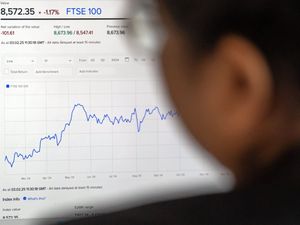Lammy says Britons ‘very concerned’ as Trump claims Starmer ‘happy’ over tariffs
David Lammy said people across the country were ‘very concerned’ about how the move to slap 10% import taxes on goods would hit their own finances.
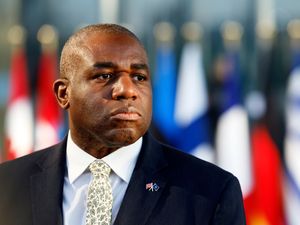
The UK Foreign Secretary has said he regrets America’s “return to protectionism” after Donald Trump insisted Sir Keir Starmer was “very happy” with Britain’s treatment over US tariffs.
David Lammy said people across the country were “very concerned” about how the move to slap 10% import taxes on goods would hit their own finances, and that “all options” remain on the table to respond in the national interest.
Ministers have insisted they will remain “cool and calm” as they seek to secure an economic deal to mitigate the damage to Britain, but are not ruling out the possibility of retaliatory levies on a range of American products.
But despite the UK Government having made clear its disappointment in the tariffs, the US President told journalists on board Air Force One late on Thursday that the Prime Minister was “very happy” with the result.
Asked whether it was time for the UK to stand up to Mr Trump, Mr Lammy told reporters following a meeting with Nato counterparts in Brussels: “The United Kingdom, like France, is a great maritime nation.
“We are a nation that believes in open trade, and I regret the return to protectionism in the United States, something that we’ve not seen for nearly a century.

“As you know, we are consulting with business and industry. At this time, we are engaged in discussions with the United States to strike an economic agreement and an economic deal.
“And of course, we have been absolutely clear that all options are on the table as we ensure the national interests of the British people, who will be very concerned at this time about how this affects the bottom line for them and their economic welfare.
“We will put their national interest first, and it’s in their national interests to be negotiating with the United States an economic agreement at this time, but keeping all options on the table.”
Mr Trump had said of Sir Keir on Thursday: “We have a very good dialogue. I think he was very happy about how we treated them with tariffs.”
French President Emmanuel Macron has gone further than the UK in criticising Mr Trump’s decision, denouncing it as “brutal and unfounded” decision after 20% tariffs were hiked on the EU.
The US President’s announcement on Wednesday sent stock markets tumbling across the globe, with the Prime Minister warning it marks the beginning of a “new era” in world trade.
British goods will be subject to a 10% import tax, which is the lowest “baseline” category, but Sir Keir has acknowledged UK exporters will still be hurt by the levy.
While the blanket tariff will come into effect on Saturday, the car industry has already been hit with a 25% import tax which began in the early hours of Thursday morning.
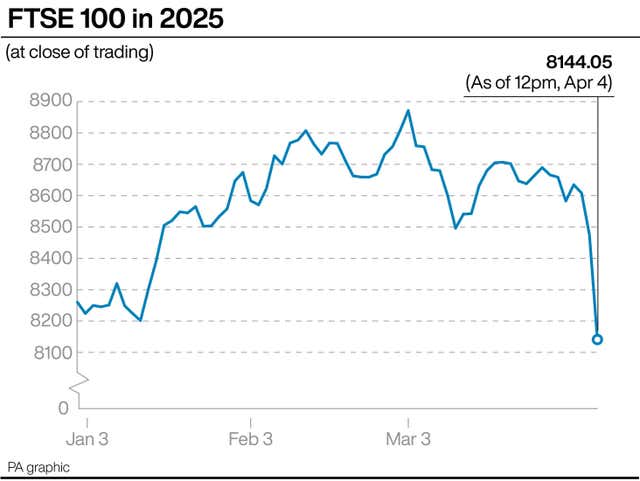
London’s FTSE 100 index of companies declined further after the City’s financial markets opened on Friday morning, by 0.53%, or around 45 points, to 8,429.98 points immediately after the start of trading.
An “indicative list” published by the UK Government on Thursday showed products that could be targeted as part of retaliatory action, including bourbon whiskey, motorcycles, guitars and jeans.
But an immediate response is unlikely as Trade Secretary Jonathan Reynolds told MPs he would hold a four-week consultation on countermeasures.
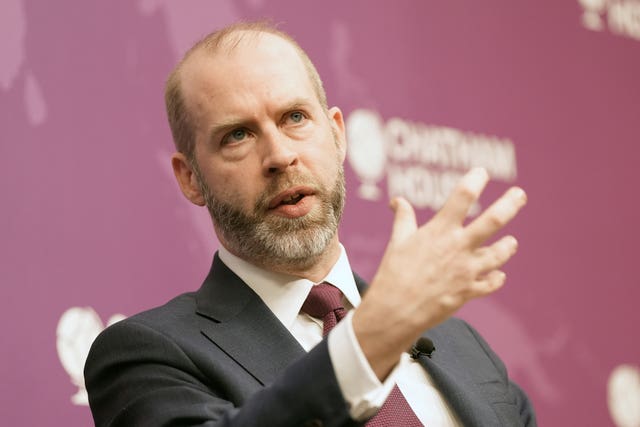
Speaking to broadcasters on Friday, Treasury minister James Murray refused to back Mr Trump’s characterisation of Sir Keir’s feelings about the announcement, but stopped short of criticising the US president.
Asked whether the Government agrees with his assertion that the UK was happy with its treatment, the exchequer secretary to the Treasury told Times Radio: “We’re disappointed at tariffs being imposed globally.
“We are in a better position than many other economies moving forward because we’re on the lowest band of tariffs. But our focus is to get that economic deal.”
But he said “important” online safety protections for children are “not up for negotiation” in trade talks, amid speculation that legislation could be watered down to secure an agreement.
Asked whether the Online Safety Act could be altered, he told Sky News: “It’s really important for us to have those protections for children and vulnerable people online.
“Those important protections are not up for negotiation. Those basic protections are things we want to keep.”
Meanwhile, shadow chancellor Mel Stride told Sky News: “Our hope now is that the Government steps up to the plate, moves forward rather more quickly in order to secure a deal because that is the best solution for our country.”
The Government still hopes for a deal with the US to secure some exemption from the tariffs, with Sir Keir promising businesses on Thursday that he would “fight for the best deal for Britain”.
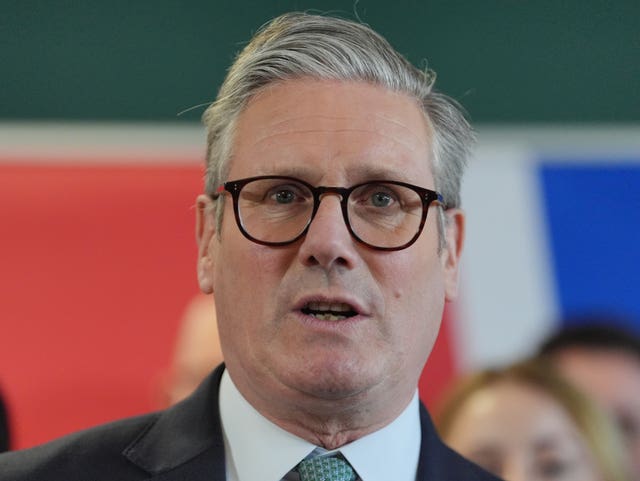
But even with an agreement, the global impact of Wednesday’s tariffs is expected to cause a significant economic shock to the UK.
Experts predicted that UK economic growth – already expected to amount to just 1% this year – could be up to 0.5 percentage points lower than expected over coming years as a result of the tariffs.
Thomas Pugh, economist at RSM UK, said he believed the tariffs would be “not far off” wiping out Chancellor Rachel Reeves’s fiscal headroom by the time she announces her second budget in the autumn.
Last week, the Office for Budget Responsibility warned that Ms Reeves’s headroom against her debt target would be at serious risk if tariffs were imposed.
If this proves to be correct, the Chancellor will face the prospect of imposing more spending cuts or tax rises if she does not change her fiscal rules.


